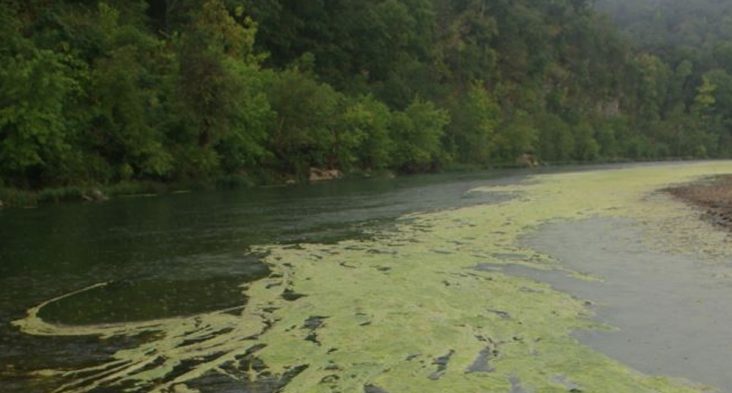U.S. Reps. Hill and Womack seek info on ‘long-term health’ of the Buffalo River
by October 2, 2018 5:10 pm 1,654 views

With a rise in reports of algae growth on the Buffalo River, U.S. Reps. French Hill, R-Little Rock, and Steve Womack, R-Rogers, have asked the National Park Service (NPS) for information on the “long-term health” of the river.
The letter to National Park Service Acting Director Daniel Smith comes a week ahead of a hearing by the Arkansas Department of Environmental Quality (ADEQ) on the denial of renewing a permit for the operation of a large hog farm in the Buffalo River watershed.
The ADEQ will on Oct. 9 hold another hearing on the C&H Hog Farm permit. In January, ADEQ Director Becky Keogh denied an environmental permit for the farm. If not overturned by the Arkansas Pollution Control and Ecology Commission, the denial effectively shuts down the hog operation. The 13-person APC&E commission, which includes six members from six state agencies and seven appointed by the governor, serves as the environmental policy-making body for the state.
The ADEQ in July released a draft plan to address “troubled” Arkansas water resources. In the Buffalo River watershed, four problem areas were identified as impaired, including three for bacteria and one for dissolved oxygen. Of the assessment area with bacterial problems, two exceeded federal limits for E coli.
‘VITAL’ RESOURCE
“Not only is the Buffalo National River the ultimate icon of the Natural State, it is an essential economic engine for the Ozark region. The river attracted more than 1.7 million visitors in 2016, supporting 1,200 jobs and generating benefits in excess of $90 million. One can understand our natural concern about the recent media reports,” noted the letter dated Oct. 2 and signed by Hill and Womack.
In a Tuesday statement, Hill said addressing the Buffalo River issues is “vital.”
“Algae growth has plagued our nation’s first national river and one of Arkansas’s most prized rivers, Arkansas’s Buffalo National River. … Protecting this watershed is vital for the ability of Arkansans and visitors to enjoy this beautiful free-flowing resource. I look forward to hearing Acting Director Smith’s response to my questions, and I am committed to taking additional action to ensure the Buffalo National River is protected and preserved for future generations,” Hill noted.
Womack said the “inquiry will help us evaluate water quality and management, and I look forward to updates on the issue. It’s important that we ensure the enjoyment of America’s first national river for generations to come.”
Following are some of the requests made by Hill and Womack in the letter to Smith.
• Seeking perspective on if a seasonal algae problem is better or worse in recent years.
• A request for “best practices” the NPS has in place to minimize algae growth on the river.
• Impact of “general erosion from roads or other activities” within the watershed on phosphorus and oxygen levels in the river.
• Efforts by NPS to work with agri producers in the watershed to “ensure greater watershed health” for future generations.
However, the Hill and Womack letter made no mention of the hog farm which has by far received the most attention for its potential impact on the river. Talk Business & Politics asked both offices if they had sent the ADEQ a letter similar to the NPS letter asking for that agency’s input in the health of the Buffalo River. They were also asked if they had issued a position on the hog farm permit.
“Congressman Womack is supportive of both the efforts to ensure the Buffalo National River remains protected for the enjoyment of future generations and farmers who follow existing regulations governing agricultural land uses and practices. I am not aware of any correspondence to ADEQ,” noted a response from Rep. Womack spokeswoman Alexia Sikora.
Hill’s office did not respond.
ADEQ ACTION HISTORY
In August 2015, the Commission ordered a five-year ban on new permits for large swine factory farms in the watershed. Those affected by the hold on permits include farms with at least 750 swine weighing over 55 pounds or 3,000 swine weighing less than 55 pounds.
A few months later, C&H Farm’s Reg. 5 permit expired, but the hog operator was allowed to remain in operation while its application for a new permit was reviewed. Then in December 2016, Harbor Environmental and Safety of Little Rock presented a highly-anticipated report that said a review of a drilling study of the C&H Farm on the pristine watershed showed no sign of pollution from waste storage ponds at the Newton County farm.
In early 2017, ADEQ began hosting hearings to discuss C&H’s new permit, allowing the swine farm to apply liquid waste on “numerous farm fields in Newton County” in accord with Commission’s Reg. 5. ADEQ received C&H Hog Farm’s application for a new permit in April 2016. The draft permit shows that 630 acres are available on which to apply the waste and could receive about 13 million gallons of waste. Total waste the farm is expected to generate is 2.62 million gallons annually, which includes animal waste, wash water, rainwater and storm events.
The application sites are about 4.7 miles or more from the Buffalo River. The waste would come from the swine farms’ two storage ponds, which can hold a combined amount of more than 2.33 million gallons. The farm has two houses that confine six boars, 2,252 gestating sows, 420 lactating sows and 750 nursery pigs. The pits beneath, where the animals are kept, hold up to 768,145 gallons of manure temporarily before draining into the holding ponds.
Talk Business & Politics senior reporter Wesley Brown contributed to this report.
